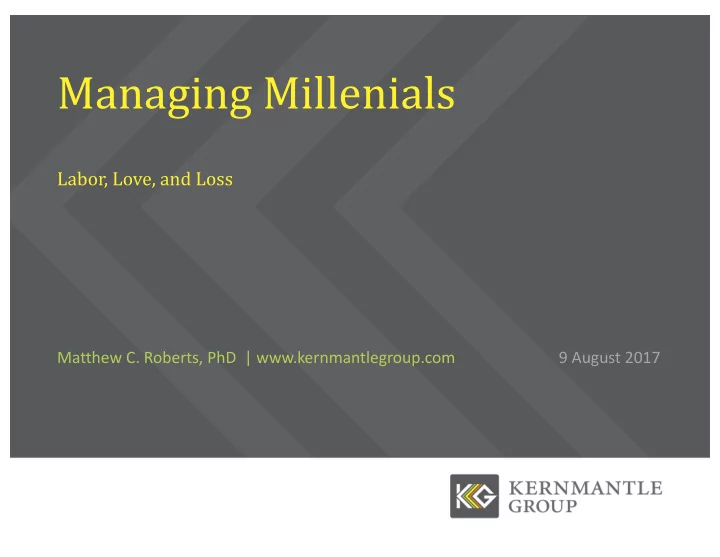

Managing Millenials Labor, Love, and Loss Matthew C. Roberts, PhD | www.kernmantlegroup.com 9 August 2017
I must study politics and war that my sons may have liberty to study mathematics and philosophy. My sons ought to study mathematics, philosophy, […] commerce, and agriculture, in order to give their children a right to study painting, poetry, music, architecture, statuary, tapestry, and porcelain. --John Adams, 1780
My father studied politics and war so that I may have liberty to study mathematics and philosophy. I studied mathematics, […] commerce, and agriculture, in order to give my children the right to create hashtags such as #Resist and #OccupyWallStreet, spend thousands on tattoos and piercings and organize anti-globalist protests at Starbucks on their MacBooks. --Matt Roberts (2017)
The children now love luxury; they show disrespect for elders and love chatter in place of exercise. Children are tyrants, not servants of the households. They no longer rise when their elders enter the room. They contradict their parents, chatter before company, gobble up dainties at the table, cross their legs, and tyrannize over their teachers . --Aristophanes (but often incorrectly attributed to Socrates)
Who are Millenials? • Born 1982-1998ish (ages 19ish-35) • Between Generation X and Generation Z
What are Millenials? • The children of baby-boomers (mostly) • The wealthiest generation in history. • The most educated generation in history. • Born into the 80s and 90s • Over-protected • First fully computerized generation
Where are Millenials (living)? • Cities and urban areas. • They have grown up with a more urban-centric view of life than any generation in modern times.
When are the Millenials (entering the workforce)? • Three most common ages in America today: • 26, 25, 27
Why are Millenials (so important)? • In 2016, Millenials became the largest segment of the workforce. • There is a decided ‘dip’ in the population of the US between the Boomers & the Millenials… • Because there are fewer GenX in the labor force, Millenials will and are advancing more quickly. • Society’s ideals are often heavily by those in their 20s and 30s: Actors, Writers, Lobbyists, Aides
What has the world looked like? • Peaceful • ’Everyone gets a ribbon’ • Demand rapid praise and rewards. • Protected from failure • Prosperous • Less work experience/ethic • High School experience more often centered on sports and academics, not work. • Given unprecedented levels of independence from an early age. • Electronic • How long can they go without checking their phone?
But also… • Peaceful • Passionate and cause-driven • Prosperous • Extremely well-educated • Care more about experiences than things • Electronic • Fast learners, able to efficiently use Google.
Meet Nick: • 25yo • Dreadlocks • Vegan • 1 class left to graduate college • Won’t check email once he leaves work. • Lives in a 1997 Dodge van
Millenials are no better or worse than any generation before. • What is different: motivation • Millenials care about meaning • This doesn’t mean that they have to always be saving the world. • But they need to see how they fit into a bigger picture. • Millenials want feedback. • They have grown up in a world of instant gratification and touchy-feely relationships. • GIVE IT TO THEM. Because you probably aren’t giving enough to your older employees, either.
Millenials are no better or worse than any generation before. • Millenials struggle with hierarchy/deference . • Raised in a radically post-modern world • Truth is only absolute-ish, at best • Lack intellectual humility • Remember: fewer of those High School jobs! • Millenials want growth . • Few things are more exciting that learning and growth • Professional development • ’non’ Professional development • This is source of much of ‘job hopping’
So let’s recap for managers: 1. Cast jobs in the bigger picture of the firm. Why does every job, and its quality of execution, matter? 2. Lots of feedback —and be honest—they want to develop and grow, and this is the #1 tool we all have. 3. Mentor them in how to relate to us (GenX and boomers) Because we are the customers with the most $$$. Done correctly, this will help in the workplace, too.
Recap, con’t 4. Help them understand that they still have a lot to learn and understand, and that you will help them do so. 5. Make plans for development : training, travel, etc. If you employ more than 1, consider job- swapping. 6. The Millenial generation is stressing our soft skills: managing people.
So you want some development? • The best job advice book for young people. • Skills first, passion later.
Questions? Matthew C. Roberts, PhD | www.kernmantlegroup.com | @YourEconProf
Recommend
More recommend